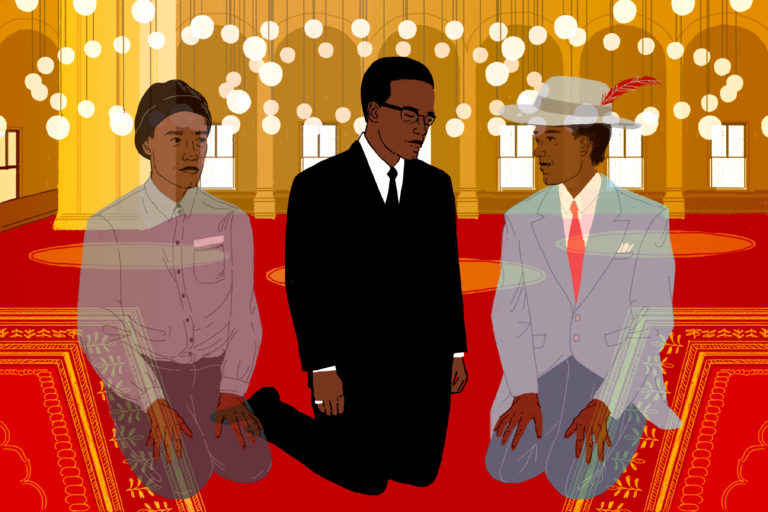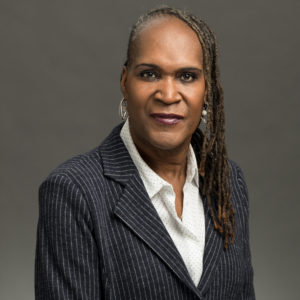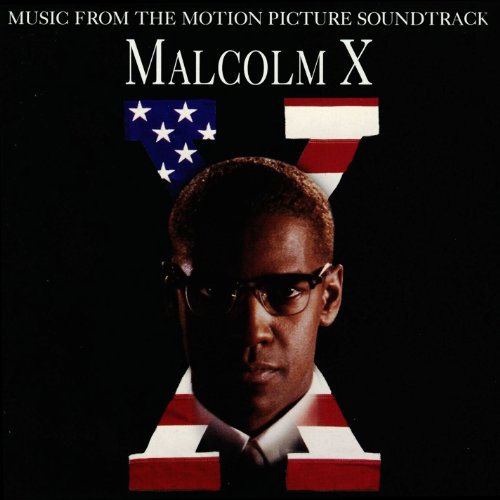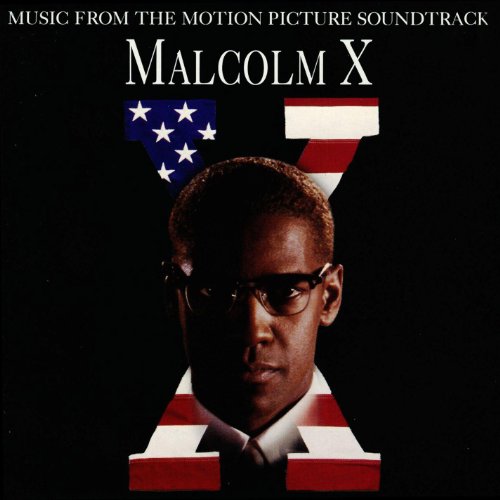Andrea Jenkins
Malcolm X
Spike Lee’s Malcolm X paints a nuanced portrait of a historical icon — as a human being who was constantly searching for his truth and who was willing to change his mind in public, over and over again. The movie takes us through the various chapters of Malcolm X’s life: first as Malcolm Little, then, in his early 20s, as “Detroit Red,” to his rise as Malcolm X, the activist preserved in history books today — and beyond. Activist and poet Andrea Jenkins related to Malcolm X’s experience of transformation and evolution portrayed in the movie. She’s a city council member in Minneapolis and was the first openly transgender black woman elected to office in the United States. She joined us for a live recording and screening of the movie at the Parkway Theater in Minneapolis.

Image by Julia Kuo, © All Rights Reserved.
Guest

Andrea Jenkins is a poet, politician, performance artist, and transgender activist. She’s the vice president of the Minneapolis city council. Her book is The T is Not Silent: New and Selected Poems.
Transcript
Lily Percy, host: Hello, fellow movie fans. I’m Lily Percy, and I’ll be your guide this week as I talk with activist and poet Andrea Jenkins about the movie that changed her life, Spike Lee’s Malcolm X. If you haven’t seen it, don’t worry. We’re gonna give you all the details you’ll need to follow along.
[music: “Shotgun” by Junior Walker and the All Stars]
Spike Lee’s Malcolm X was decades in the making. When the book first came out of The Autobiography of Malcolm X, James Baldwin actually wrote the screenplay for it, and that was in the 1960s when he first tried to adapt it into a movie. Spike Lee made this happen in the early ’90s, and the movie that he tells is a very different story of Malcolm X: of Malcolm as a human being — a man who did the thing that none of us do, which is change our minds in public, over and over and over again, illuminating the very distinct chapters of Malcolm X’s life.
[excerpt: Malcolm X]
[music: “Someday We’ll All Be Free” by Aretha Franklin]
Andrea Jenkins is an activist and a poet, and the first openly trans black woman elected to office in the United States. When she watched Malcolm X in her early 30s in Minneapolis, at a mall, she herself was coming to terms with her gender identity. And what she saw in Malcolm’s struggle around his own identities, modeled for her that she could be transformed and that she didn’t have to be afraid.
Andrea and I spoke in front of a live audience at the wonderful Parkway Theater in Minneapolis. After the interview, Andrea told me that it wasn’t until she was on stage with me, thinking through her answers, processing, that she finally realized just how much this movie has changed her.
Ms. Percy: Welcome, everyone. Thank you for joining us for this live taping of This Movie Changed Me.
[applause]
Yes! You’re being recorded, so the applause is very helpful.
[applause]
Thank you.
And I’m so excited to be here with Minneapolis city council vice president Andrea Jenkins to talk about Spike Lee’s Malcolm X. When Tony, one of our producers, reached out to see if you’d be interested in being a guest for the podcast, we had no idea what movie you would choose. And I was thrilled to hear that you had picked Malcolm X. And I want to read a little bit of what you wrote in your email back to us, explaining why you chose it. You said, “Growing up as a kid, I remember being frightened by the way media portrayed figures like Malcolm X, as he was always associated with hate. This movie gave a fuller picture of who Malcolm X was and depicted him in a more humane way than the media did.”
What you said really resonated with me, because it reminded me of how I felt when I watched it for the first time as a teenager. I felt like I was discovering a history I’d never learned in school. I grew up going to public schools in Miami, and I feel like I learned a really superficial, CliffsNotes version of the Civil Rights Movement, which included mostly Dr. Martin Luther King, Jr., but Malcolm X was just a tiny little blip.
Ms. Jenkins: Right.
Ms. Percy: And they were on the opposite sides of each other; that was always the portrayal. And what this movie shows is that that’s not the full story. The movie shows the life and the story of a man with multiple identities: he was first born Malcolm Little, in Omaha, Nebraska; then, in his 20s, he was known as “Detroit Red”; and finally, he became Malcolm X Shabazz, the Muslim American hero and revolutionary. And the movie shows that the full story of Malcolm X is far more complicated, hopeful, transformative, and, as you said, beautifully human.
To quote from one of my prophets, Roger Ebert, who wrote this when he first saw the movie, back when he reviewed it in 1992 — and if you haven’t read the whole review, I highly recommend it; it really is amazing — he said, “Walking into Malcolm X, I expected an angrier film than Spike Lee has made. This film is not an assault, but an explanation. And it is not exclusionary. It deliberately addresses all races in its audience. White people, going into the film, may expect to meet a Malcolm X who will attack them, but they will find a Malcolm X whose experiences and motives make him understandable and finally heroic […] To understand the stages of Malcolm’s life is to walk for a time in the steps of many African Americans and to glimpse where the journey might lead.” Some powerful stuff.
Ms. Jenkins: Wow. I’m getting emotional, thinking about the film right now.
Ms. Percy: Right?
Ms. Jenkins: You will cry in this movie, I guarantee.
[laughter]
Ms. Percy: You will cry. So before we go too far into the movie, I’d like you to take some time and just close your eyes. And I want you to think about — for about ten seconds — the first time you saw the movie: who you were with, how old you were, where you were, all the memories that you have. And I’ll just chime in when those ten seconds are up.
What memories came up for you?
Ms. Jenkins: Wow. It was probably — I was very early 30s, like maybe 31, 32 …
Ms. Percy: So you were living here already.
Ms. Jenkins: I was living in Minneapolis. Maybe I saw it at Southdale or somewhere like that.
Ms. Percy: [laughs] A great mall; go there often.
Ms. Jenkins: But I feel like I went to see it with my partner at the time. Interestingly, pretty sure I was much more masculine-presenting at the time. And there was just this feeling of pride — it was kind of — I don’t know — did anybody experience Black Panther in the theater?
Ms. Percy: Oh, yeah. It was like a sacred space, everybody in there together — and a particularly black space.
Ms. Jenkins: Right; exactly.
Ms. Percy: Was that what that was like?
Ms. Jenkins: It was very much like that. It felt very much like that, even though, at Southdale, there was a little less …
[laughter]
… of a black space than … [laughs]
Ms. Percy: Could have maybe been the blackest it had been, at that point. [laughs]
Ms. Jenkins: Right. But I think it felt like being openly expressive of one’s blackness was a thing. And I think, for much of history prior, that was not the case. There is a very complex history of being black in America, and I think Malcolm really addressed that in a really beautiful way, trying to reimagine the narrative that had been shaped around blacks in America, and creating a sense of pride, a sense of determination.
[excerpt: Malcolm X]
Ms. Percy: I watched this movie last week as I was getting ready for this conversation with you. And this may be weird, because we haven’t met before today, but I felt like you were there with me, watching it …
Ms. Jenkins: Wow, OK.
Ms. Percy: … because I kept thinking about your own journey as an African-American transgender woman, the many identities you hold — poet, oral historian, activist, city council member, just to name a few, and the distinct chapters of your life. All of this I watched, as I saw Denzel Washington portray Malcolm X onscreen. And it reminded me of what Attallah Shabazz, one of Malcolm X’s daughters, wrote. She writes it in the foreword of the book, in the book The Autobiography of Malcolm X. She writes, “My father’s life, and its stages of personal metamorphosis and enlightenment, stand as a confirmation of how one can, through witness and transformation, ultimately claim one’s own divine path.”
And I’m just curious to know how this movie, whether consciously or unconsciously, shaped your own path, your own claiming of your own divine path, as you thought about the many chapters and identities of your life.
Ms. Jenkins: I’m getting emotional again.
Ms. Percy: We’re in an emotional space. We can do it.
Ms. Jenkins: This is On Being, huh. That’s right. [laughs]
[laughter]
Ms. Percy: As On Being Studios, that’s right, we’re allowed to go there. [laughs]
Ms. Jenkins: There’s some spiritualness going on, I’m feeling. One of the things that impacted me the most about this movie was less about Malcolm X than it was about Denzel Washington and how he became Malcolm X. He literally — there’s a point in the movie when — it’s about halfway through, and you’re like, “Oh, my God. That’s Malcolm X.” And so I was really transfixed by the shifts in realities because, I think, I have experienced many of those, in many, many ways, some that almost mirrored that.
Ms. Percy: Talk a little bit about that.
Ms. Jenkins: Well, I was never in penitentiary, but my father was for about 15 years. And so, as a child, as a young person, I would go visit my father; my sister and I, my grandparents would take us. And they literally wore the same denim uniforms that Malcolm X wore.
Ms. Percy: Because for a period of his life, he does go to prison.
Ms. Jenkins: For a pretty substantial period of his life.
Ms. Percy: Pretty substantial period.
Ms. Jenkins: And so there was that sort of realization that — and I was angry at my father for a long time. But that movie helped me understand how this society had really conspired to undermine black men in such a way that only the very lucky few were able to overcome the hurdles and the challenges that were societal, that were embedded, baked into our system, and that is still there to this day. And it helped me have a little bit more of an understanding of the challenges that my own father experienced.
My father was probably more akin to “Detroit Red.” And he didn’t get that opportunity to transform, like Malcolm did.
[excerpt: Malcolm X]
Ms. Jenkins: Initially, I was like, “Why am I picking this movie?” [laughs] because it’s long as fuck.
[laughter]
Ms. Percy: Because it’s long, and it’s hard. [laughs]
Ms. Jenkins: And it’s hard.
Ms. Percy: It’s still challenging.
Ms. Jenkins: But the ending is so beautiful.
Ms. Percy: Well, challenging is one of the things I love about Spike Lee’s work, is, it’s always challenging. And watching this — we talked about the fact that this movie was released in 1992, in the wake of the LA riots. So the movie opens with those interspersed images of …
Ms. Jenkins: Rodney King.
Ms. Percy: … Rodney King, being brutally beaten by police officers, as well as the image of the American flag burning, while we hear Denzel Washington reciting, performing one of Malcolm X’s speeches.
[excerpt: Malcolm X]
And then you have Terence Blanchard’s score. And it’s just so haunting.
[music: “Opening Credits” by Terence Blanchard]
That opening has stayed in my mind since I saw it when I was a teenager, as well as the scene where —
Ms. Jenkins: And it burns into an “X.”
Ms. Percy: It burns into an “X.” And you’re like, that’s the first five minutes.
[laughter]
You’re like, where is this movie gonna go? [laughs]
Ms. Jenkins: Right; exactly.
Ms. Percy: And it goes to places that, watching it today, it was actually shocking to see how relevant — like, the scene where Malcolm’s getting ready to talk — I think it must’ve been Columbia University or something — and a white, really well-intentioned college student, woman, comes up to him and says, “I really love your work. I’m so with you. What can I do to help?” And he just says to her, “Nothing.”
And that scene landed really differently for me today, watching it with where we are in this moment. I’m curious about how these scenes land for you today. 1992 was a different time, and yet, there’s so much that’s still so resonant and, honestly, that hasn’t changed.
Ms. Jenkins: Yeah, no, I mean, Malcolm X is talking about police brutality and the murder of unarmed black men. That’s still very much on the front page of the newspaper today. Unemployment, access to education —
Ms. Percy: All the things that Malcolm X talked about.
Ms. Jenkins: He was concerned about health care and babies dying in childbirth, and mothers. And all of these issues are still relevant and prevalent with us, today. So we do, I think, continue to move closer to the reality of this American experiment, but every time we get a little closer, we get dragged a long way back.
This is not a new phenomenon, folks. This is America. And we can change it; we have to want to; we have to recognize that the reality that Malcolm came to at the end of his life, that everybody on this planet matters, deserves love, deserves life, liberty, and the pursuit of happiness. It is not just something that is sacred to rich, wealthy, white people. It is the human right of everybody on this entire planet. And those were the values that he stood up for. And that, I think, is what really makes this movie stand out, for me.
[music: “Arabesque Cookie” by Duke Ellington]
[excerpt: Malcolm X]
[music: “That Lucky Old Sun (Just Rolls Around Heaven All Day)” by Ray Charles]
Ms. Percy: I hope you’re enjoying my live conversation with Andrea Jenkins. As our listener, your feedback plays an important role in shaping This Movie Changed Me. Let us know your thoughts about our show by completing our survey. You can find it at onbeing.org/tmcmsurvey. Respond before November 24, and you’ll be entered to win a set of 16 illustrations, one for every episode of this season — from Ratatouille and The Exorcist to Groundhog Day and The Wizard of Oz. Once again, that’s onbeing.org/tmcmsurvey. And we can’t wait to hear from you.
[music: “Chickens Come Home” by Terence Blanchard]
Ms. Percy: One of the things that I really value the most, watching this movie now, at the age of 37, that I didn’t see at the age of 13 or 14, when I first saw it, is that the character of Malcolm X models someone who is a lifelong learner. In the movie, we see him make mistakes, and he owns them, publicly. No less, publicly, he apologizes. He owns his mistakes. And we watch him change his mind repeatedly. I watch a lot of movies, and I can’t think of another leading character who models this as clearly as he does. And I wonder how this movie, when you think about it, and Malcolm in particular, as a lifelong learner, how that’s grown with you, how it’s changed with you as you’ve gotten older and you’ve seen it throughout your life.
Ms. Jenkins: Well, I absolutely relate to the lifelong learner [laughs] label. So I graduated from high school in 1979, exactly 40 years ago. I moved to Minneapolis to go to the University of Minnesota. And I did about three years at the U and then left school — not intentionally; I was sort of forced out. I was outed by one of my fraternity brothers as “gay,” is how he framed it, and I came out as bisexual. So, very publicly having this …
Ms. Percy: Learning moment.
Ms. Jenkins: … really deeply internal reality literally played out in real life. And I had to leave school, because we were roommates, and he kicked me out of the apartment, and I had no place else to go. So I had to go back home, come out to my family …
Ms. Percy: In Chicago.
Ms. Jenkins: … in Chicago. So there was this whole tumultual time, and I would go back to school periodically, throughout my life, but eventually — it took me 20 years to complete my bachelor’s degree from Metropolitan State University, whose motto is, “Be a lifelong learner.” [Editor’s Note: Metropolitan State University’s motto is “Where life and learning meet.”]
[laughs]
Ms. Percy: Oh, wow. I didn’t know that.
Ms. Jenkins: So I did that and then — but right at that time, right around the time that I came out as a trans-identified person, which was probably around 1992, ’93, so right when this movie was being released, I — when I came out, I felt like I opened myself up. And it was very public. And at the time, the medical world was saying, transgender people, you should come out, do your transition, move to another city, and just create a new identity. But I didn’t want to do that. I had family here. I had a daughter from a marriage that I had entered into as a way to try to overcome my gender dysphoria. And so I stayed here in this very public environment, and people — I still run into people today who reference my past life. And so I think that was — you can relate that to this transformation, I think, that Malcolm X’s life took and how the movie really distinctively portrays those different phases of his life and learning. And my life has been very much like that, these completely distinct chapters. But they all kind of flow into each other and feed into each other, which I think was very similar to Malcolm X.
[excerpt: Malcolm X]
[music: “Someday We’ll All Be Free” by Aretha Franklin]
Ms. Percy: So you write in the preface to this beautiful poetry book, The T Is Not Silent, “This book is an effort to create understanding and awareness of a marginalized community, a community that is invisible to most and vilified by some, a community that is traumatized by the constant threat of violence, as well as unemployment, housing instability, discrimination in multiple areas of social and economic life, a community that is also creative, beautiful, and resilient.” And these words remind me of so many of Malcolm X’s and of what he fought for. And I’d just love for you to close our conversation by reading your amazing poem, “We Are Not Quitters,” from the same collection, if you don’t mind.
Ms. Jenkins: Hmm, wow. Thank you for that introduction to this poem. One of the really amazing things about Malcolm X — and, I think, about so many leaders — some, but not all — but he was really deeply motivated by his love for black people. That was his mission.
This poem is called “We Are Not Quitters.” It was written in 2009, right after the first State of the Union speech given by the first black president of the United States of America, Barack Obama. And he talked about these young people that had written him a letter. They said they didn’t have new books in their school. Their school had holes in the walls. But they were so inspired by his election, and they wrote to him this long, impassioned letter that ended with “We are not quitters.”
“‘I don’t know much, but I’ve seen a few things, and a few things have seen me too.’ Sekou Sundiata.
1
This I know: that I wonder what I know, sometimes. I know that there are things that I don’t know. I do know that there are songs in the key of life, songs in amethyst, in opals, in sapphires, songs in the sycamore trees, singing in the persimmons, in periwinkle. There are songs ringing from oceans, from creeks, from seas, from brooks, from rivers; songs bouncing from the throats of the bumblebee, the bullfrog, the beagle; a song in the whistling whir of the wheels on an automobile, a Red Flyer, a locomotive, or even a bicycle that still slides you from point A to Z. I know this: there is always a song.
2
I know that in the absence of music, there is a narrative of sorts, a human tale as epic as any ever whispered or bellowed from the second stair of the portico, or stuttered and strained on a shivery morning in the silvery sunshine to the entire world. I know that there is a story etched in the center of the Earth, in our collective consciousness, in our distant past. I know that there is no end to this story, no beginning to this story. It manifests in poems, in songs, in everyday language, in complex internal rhymes. This we do for love.
3
All that I know, I do not know. All that I see, I have not seen. All that I hear, I have not heard — those singing amethysts, opals, sapphires, persimmon, periwinkle, oceans, seas, rivers, bumblebees, the beagle. A song can serve up love on a wax platter. A love supreme will stay in my heart, a love that is supreme, as in, above all else; a love that is supreme, as in, let no man put asunder; a love that is supreme, as in, this will be, as in evergreen, as in tie a yellow ribbon round the old oak tree — a love that will stay in my heart. And if it is dark, and you feel lonely and cold, and if you get tired and fatigue sets in, remember: We are not quitters.”
Thank you.
[applause]
[music: “Don’t Cry Baby” by Erskine Hawkins]
Ms. Percy: Andrea Jenkins is a poet, politician, performance artist, and transgender activist. She’s the vice president of the Minneapolis city council and the first openly trans black woman elected to office in the United States.
Special thanks this week to Zoe Bourgerie, Patrick Marschke, Ward Johnson, Lauren Wicklander, and all of the staff at The Parkway Theater.
40 Acres and a Mule Filmworks produced Malcolm X, and the clips you heard in this episode are credited entirely to them. Terence Blanchard wrote the haunting score for Malcolm X, and Qwest and Reprise Records released the movie’s soundtrack. Fun fact: Some of the musicians featured on the soundtrack were also personal friends with Malcolm X during his life.
[music: “Roll ’Em Pete” by Big Joe Turner]
Next week on This Movie Changed Me, I’ll be speaking with the comedian Justin Sayre. We’ll be talking about the 1950s movie Auntie Mame, and even though it’s an older one, it’s still worth your time. Find it on all the usual streaming spots, and I can’t wait for you to hear Justin’s humor and wisdom.
The team behind This Movie Changed Me is: Maia Tarrell, Chris Heagle, Tony Liu, Kristin Lin, and Lilian Vo. This podcast is produced by On Being Studios, which is located on Dakota Land. We also produce other podcasts you might enjoy, like On Being with Krista Tippett and Becoming Wise — find those wherever you like to listen or visit us at onbeing.org to find out more.
I’m Lily Percy, and I recommend you take some time to think about all the different versions of yourself, the ones that make you who you are today.
Books & Music
Recommended Reading
The On Being Project is an affiliate partner of Bookshop.org and Amazon.com. Any earnings we receive through these affiliate partnerships go into directly supporting The On Being Project.








